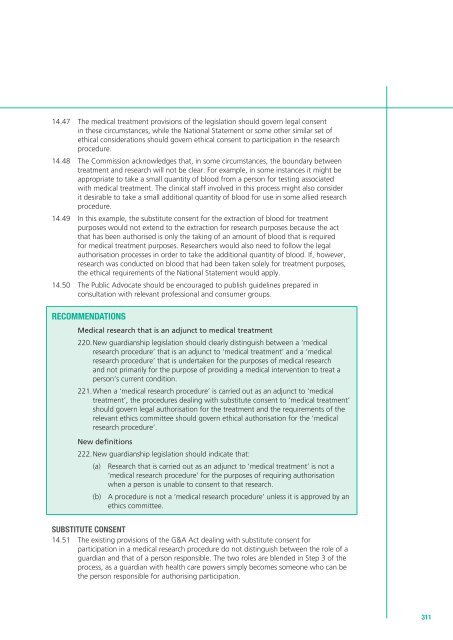Medical research - Victorian Law Reform Commission
Medical research - Victorian Law Reform Commission
Medical research - Victorian Law Reform Commission
You also want an ePaper? Increase the reach of your titles
YUMPU automatically turns print PDFs into web optimized ePapers that Google loves.
14.47 The medical treatment provisions of the legislation should govern legal consent<br />
in these circumstances, while the National Statement or some other similar set of<br />
ethical considerations should govern ethical consent to participation in the <strong>research</strong><br />
procedure.<br />
14.48 The <strong>Commission</strong> acknowledges that, in some circumstances, the boundary between<br />
treatment and <strong>research</strong> will not be clear. For example, in some instances it might be<br />
appropriate to take a small quantity of blood from a person for testing associated<br />
with medical treatment. The clinical staff involved in this process might also consider<br />
it desirable to take a small additional quantity of blood for use in some allied <strong>research</strong><br />
procedure.<br />
14.49 In this example, the substitute consent for the extraction of blood for treatment<br />
purposes would not extend to the extraction for <strong>research</strong> purposes because the act<br />
that has been authorised is only the taking of an amount of blood that is required<br />
for medical treatment purposes. Researchers would also need to follow the legal<br />
authorisation processes in order to take the additional quantity of blood. If, however,<br />
<strong>research</strong> was conducted on blood that had been taken solely for treatment purposes,<br />
the ethical requirements of the National Statement would apply.<br />
14.50 The Public Advocate should be encouraged to publish guidelines prepared in<br />
consultation with relevant professional and consumer groups.<br />
Recommendations<br />
<strong>Medical</strong> <strong>research</strong> that is an adjunct to medical treatment<br />
220. New guardianship legislation should clearly distinguish between a ‘medical<br />
<strong>research</strong> procedure’ that is an adjunct to ‘medical treatment’ and a ‘medical<br />
<strong>research</strong> procedure’ that is undertaken for the purposes of medical <strong>research</strong><br />
and not primarily for the purpose of providing a medical intervention to treat a<br />
person’s current condition.<br />
221. When a ‘medical <strong>research</strong> procedure’ is carried out as an adjunct to ‘medical<br />
treatment’, the procedures dealing with substitute consent to ‘medical treatment’<br />
should govern legal authorisation for the treatment and the requirements of the<br />
relevant ethics committee should govern ethical authorisation for the ‘medical<br />
<strong>research</strong> procedure’.<br />
New definitions<br />
222. New guardianship legislation should indicate that:<br />
(a) Research that is carried out as an adjunct to ‘medical treatment’ is not a<br />
‘medical <strong>research</strong> procedure’ for the purposes of requiring authorisation<br />
when a person is unable to consent to that <strong>research</strong>.<br />
(b) A procedure is not a ‘medical <strong>research</strong> procedure’ unless it is approved by an<br />
ethics committee.<br />
Substitute consent<br />
14.51 The existing provisions of the G&A Act dealing with substitute consent for<br />
participation in a medical <strong>research</strong> procedure do not distinguish between the role of a<br />
guardian and that of a person responsible. The two roles are blended in Step 3 of the<br />
process, as a guardian with health care powers simply becomes someone who can be<br />
the person responsible for authorising participation.<br />
311
















